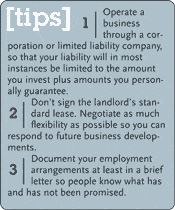Tanner Montague came to town from Seattle having never owned his own music venue before. He’s a musician himself, so he has a pretty good sense of good music, but he also wandered into a crowded music scene filled with concert venues large and small.But the owner of Green Room thinks he found a void in the market. It’s lacking, he says, in places serving between 200 and 500 people, a sweet spot he thinks could be a draw for both some national acts not quite big enough yet for arena gigs and local acts looking for a launching pad.“I felt that size would do well in the city to offer more options,” he says. “My goal was to A, bring another option for national acts but then, B, have a great spot for local bands to start.”Right or wrong, something seems to be working, he says. He’s got a full calendar of concerts booked out several months. How did he, as a newcomer to the market in an industry filled with competition, get the attention of the local concertgoer?
Startups
business builder startups
Avoid 10 common
legal mistakes when starting out
by Mitchell Cox and Richard Kelber
Starting a business can be intimidating. Choosing a location, hiring staff and building a customer base are among many pieces of a puzzle that must be assembled in order to build a strong business.
In the midst of all that activity, important elements of legal planning can be overlooked, sometimes with consequences that aren’t easily remedied. The following are 10 common legal mistakes made by new business owners and advice on how to approach each situation.
1. Going naked. Operating your business as a proprietorship or general partnership, without a liability shield, is the legal equivalent of going naked. By forming and operating the business through a corporation or limited liability company, your liability will in most instances be limited to the amount you invest plus amounts you personally guarantee. Without a liability shield, you will be personally liable for the business. While this may not be a problem if your business succeeds, many new businesses fail.
2. Not planning taxes. Most new businesses generate losses during a start-up period, but
those losses can have tax value. To utilize tax losses while enjoying limited liability, many businesses organize as either an LLC or an S corporation. The tax code contains an elaborate set of rules addressing the taxation of S corporations and places restrictions on their capital structure. Since LLCs are not subject to the same restrictions, there is a growing trend for new businesses to organize as LLCs. Organization as an S corporation or LLC has the added benefit of facilitating the eventual sale of the business assets with only one level of tax.
3. Not safeguarding equity. Successful owners safeguard their equity to protect their upside. Choose your co-owners carefully. If a co-owner doesn’t work out, changing the arrangement can lead to substantial legal fees and costs at a time when the business can’t easily afford it. If possible, enter into a “buy-sell” agreement with your co-owners.
Many owners issue equity to key employees for sound business reasons. However, sometimes the employee’s contribution is less significant than anticipated or the relationship sours. Carefully drawn stock option agreements and other arrangements can link equity ownership to performance, securing your value in return for parting with equity.
4. Losing control. Protect both your upside and downside by maintaining control of the business. For either a corporation or LLC, the owners elect a board and the board elects the officers. As an owner, electing a majority of the board is your key to control. Use a “Shareholder Control Agreement” or “Member Control Agreement” to be sure your expectations are fulfilled.
5. Inadvertent violations of securities laws. Many new business owners mistakenly believe that securities laws only apply to companies that are traded on national stock exchanges. Shares of stock in a corporation and membership interests in an LLC are considered securities under state and federal laws. It is illegal to sell securities in a transaction that is not exempt from registration under the securities laws. It is also illegal to misrepresent or omit material facts. Violations may create a variety of difficulties for the owner and the company, particularly if the company goes public in the future.
6. Signing the landlord’s form lease. A lease is a lease is a lease, right? NOT! Most start-up businesses lease instead of purchase their business premises. Your prospective landlord will submit a one-sided “standard” lease for you to sign. This document is negotiable! You need to negotiate as much flexibility as possible to enable you to respond to future business developments (either up or down).
A few points to consider: a short-term lease with options to extend is more flexible than a long-term lease; the landlord’s consent will also be needed for alterations, assignment, subletting and in many other circumstances; the landlord will be able to arbitrarily withhold its consent and put you over a barrel unless the lease requires the landlord to be reasonable. Watch what is billed to the tenant under the common area expense provision so that you don’t end up reimbursing the landlord for costs you think the landlord will bear. Last, but not least, try to avoid or limit any personal guarantee.
7. Failure to protect intellectual property. Intellectual property (patents, trademarks, confidential information, know-how) is often vital to success and building value. To protect your downside, conduct appropriate searches to avoid violating the rights of others. Be sure that your employees aren’t violating noncompete agreements with prior employers or improperly using a prior employer’s customer lists or other confidential information.
On the upside, protect your own trademarks by registration (relatively cheap) and valuable innovations by patenting (more expensive, but potentially powerful). Protect your own confidential information by obtaining noncompete and confidentiality agreements from all your key employees and salespeople before they start work.
8. Misunderstandings when hiring employees. Mistakes made or misunderstandings from a casual hiring process can result in aggravation, legal fees and costs a year or two later. Document your employment arrangements at least in a brief letter so people know what has and has not been promised. Be sure all employees are “at will.” Retain some discretion over bonuses, and structure them to promote retention.
9. Approaching bank documents and personal guarantees carelessely. You know your equity investment is at risk, but your total risk may be much greater. Your guarantees to banks, landlords, suppliers and others may expose you to a much greater downside. Are your guarantees limited where possible? Are your co-investors on the hook for their fair share or could you be left holding the bag yourself?
10. Failure to select competent and dedicated advisers. There is a lot to keep track of, but you have a business to run. A team of loyal and competent advisers can help you handle all of these issues, save you time and enable you to focus on the areas vital to business success. You will need an accountant, lawyer and insurance agent. In the post-Enron age, you are unlikely to find people willing to sit on your board and advise you just for the honor. But, if carefully chosen, your outside professionals can function as a board of advisers and provide ideas and guidance on many topics.






